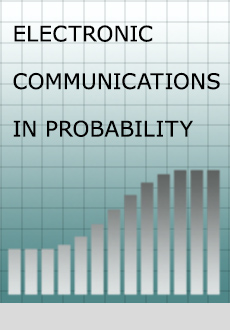Abstract
Let $(S,d)$ be a metric space, $\mathcal{G}$ a $\sigma$-field on $S$ and $(\mu_n:n\geq 0)$ a sequence of probabilities on $\mathcal{G}$. Suppose $\mathcal{G}$ countably generated, the map $(x,y)\mapsto d(x,y)$ measurable with respect to $\mathcal{G}\otimes\mathcal{G}$, and $\mu_n$ perfect for $n>0$. Say that $(\mu_n)$ has a Skorohod representation if, on some probability space, there are random variables $X_n$ such that<br />\begin{equation*}<br />X_n\sim\mu_n\text{ for all }n\geq 0\quad\text{and}\quad d(X_n,X_0)\overset{P}\longrightarrow 0.<br />\end{equation*}<br />It is shown that $(\mu_n)$ has a Skorohod representation if and only if<br />\begin{equation*}<br />\lim_n\,\sup_f\,\left|\mu_n(f)-\mu_0(f)\right|=0,<br />\end{equation*}<br />where $\sup$ is over those $f:S\rightarrow [-1,1]$ which are $\mathcal{G}$-universally measurable and satisfy $\left|f(x)-f(y)\right|\leq 1\wedge d(x,y)$. An useful consequence is that Skorohod representations are preserved under mixtures. The result applies even if $\mu_0$ fails to be $d$-separable. Some possible applications are given as well.
Citation
Patrizia Berti. Luca Pratelli. Pietro Rigo. "A Skorohod representation theorem without separability." Electron. Commun. Probab. 18 1 - 12, 2013. https://doi.org/10.1214/ECP.v18-2793
Information





